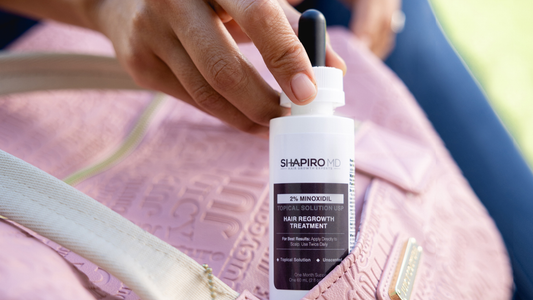Approved by the U.S. FDA for use in over-the-counter shampoos and body washes, pyrithione zinc is highly effective in treating scalp dandruff(seborrhea) and seborrheic dermatitis.
What is pyrithione zinc though?
Pyrithione zinc is composed of zinc ion and a derivative of aspergillic acid called pyrithione. Found in abundance in the human body, zinc ion plays a critical role in gene transcription and enzyme activity. As a topical medication, pyrithione provides anti-seborrheic, antifungal, and antimicrobial benefits for treating a variety of skin and scalp disorders.
It’s commonly found in, and popularized by, over-the-counter dandruff shampoos like Head & Shoulders and Selsun Blue. That tell-tale blue tint to these shampoos? That’s pyrithione zinc! Dozens of studies have shown pyrithione zinc to be safe for use as a topical agent.
The idea that pyrithione zinc causes cancer may stem from guidance not to ingest this potent dandruff-buster. Ingestion of zinc pyrithione may cause severe gastrointestinal disorders that require emergency treatment. Additionally, pyrithione zinc has not been tested in pediatric patients.
Here’s the skinny.
Pyrithione Zinc Does NOT Cause Cancer
There are no peer-reviewed studies published by any academic journal that indicate pyrithione zinc causes cancer. On the contrary, some studies demonstrate that pyrithione zinc has anti-carcinogenic properties that may even treat certain types of cancer.
A Molecular Oncology report investigating the response of oral cancer cells to pyrithione zinc (PYZ) discovered that PYZ is the "most effective agent for inhibiting proliferation of cancer cells" in animal studies. The authors of the study suggest PYZ should be further evaluated as a strong anticancer treatment for oral squamous cancer.
Reviews of studies involving the efficacy of zinc pyrithione as an anti-cancer agent reveal clinical results supporting anti-tumor and cytotoxic effects against cancer cells. In addition, PYZ has been shown to inhibit the growth of cancer cells in bone marrow and lungs.
Does that mean you should use PYZ for cancer?
Despite apparent capabilities in fighting cancer cells, pyrithione zinc has not been tested for this purpose in controlled clinical trials in humans. The evidence is preliminary, but it suggests PYZ is unlikely to cause cancer.
What Does Pyrithione Zinc Treat?
Seborrheic Dermatitis
A commonly diagnosed inflammation of the upper skin layers, seborrheic dermatitis presents as symptoms like itchy, red skin that sheds flakes or silvery scales - dandruff. Sometimes, this scaly rash may be yellow and develop behind the ears, around the nose, and in skin creases. Outbreaks of seborrheic dermatitis are usually attributed to cold or dry weather, hormonal changes, or genetics.
Cradle cap in infants is a type of seborrheic dermatitis that typically resolves itself by the time children are six months old. Seborrheic dermatitis in adults is called dandruff. Men and women with excessively oily hair and/or skin are at the greatest risk for developing dandruff.
Shampoos containing pyrithione zinc 1% are often recommended to clear up seborrheic dermatitis of the scalp. Some dandruff shampoos with PYZ may also contain ketoconazole (brand name Nizoral) an antifungal medication that also treats athlete's foot and ringworm.
Two types of scalp fungi--M. restricta and _Malassezia globosa--_are responsible for most dandruff cases. Treating dandruff with PYZ decreases fungal growth on the scalp and stops flaking and scaling. Although people have been using these shampoos to eradicate dandruff for decades, scientists still haven't pinpointed the mechanism by which pyrithione zinc prevents fungal growth. However, they believe it has something to do with the ability of pyrithione zinc to "starve" fungi by inhibiting the production of iron salt, a substance necessary for fungi to continue proliferating on the scalp.
Although a shampoo with PYZ works well to reduce inflammation and scaling associated with mild to moderate dandruff, studies show that combining PYZ with ketoconazole works even better to prevent the reoccurrence of chronic seborrheic dermatitis.
Androgenic Alopecia (Male or Female Pattern Baldness)
Although finasteride and minoxidil are standard treatments for androgenic alopecia, called male or female pattern baldness, a study involving 200 adult men with MPB who used pyrithione zinc shampoo 1% and minoxidil 5% for nine weeks resulted in a significant increase in their total hair counts compared to a placebo group. In addition, a group using pyrithione zinc shampoo only also showed increased hair counts but at a slightly lower number than the PYZ/minoxidil group.
Doctors know that zinc plays a key role in repairing and growing new hair tissue and supporting the proper functioning of follicle oil glands. Zinc is also needed by the body to produce keratin, a protein vital to maintaining healthy hair shafts, nails, and skin. Men with mild hair loss attributed to male pattern baldness may benefit from using a pyrithione zinc shampoo regularly.
Percentages of Pyrithione Zinc Available
A prescription from a physician or dermatologist is not needed to purchase products containing pyrithione zinc. All the following products are available over-the-counter in most grocery stores or pharmacies:
- Shampoo: 0.25%, 1%, and 2%
- PYZ lotion or cream: 0.25%
- Conditioner: 0.25%
- Soap bars: 2%
Individuals who have never used PYZ before should consider starting with skin products containing 0.25% to determine how their skin reacts to pyrithione zinc. If skin does not become irritated, the concentration can then be increased, if needed.
Pyrithione Zinc Side Effects
In extremely rare instances, individuals using topical PYZ may experience serious side effects due to having a previously unknown pyrithione zinc allergy. Signs of a PYZ allergic reaction include:
- Hives/blisters
- Peeling skin
- Difficulty swallowing
- Difficulty breathing
- Wheezing
- Feeling of tightness in the throat and/or chest
- Swelling of the tongue, lips, throat, or face
Emergency treatment for a pyrithione zinc allergy involves the administration of antihistamines or epinephrine to reduce tissue swelling and suppress the immune system response to allergens in PYZ.
Some people who aren't systemically allergic to PYZ may develop contact dermatitis, a more mild type of allergic reaction affecting the skin only. Symptoms of allergic contact dermatitis include oozing blisters that crust over, severe itching, burning, redness, swelling. Doctors typically prescribe topical steroids to treat contact dermatitis.
Does Pyrithione Zinc Treat Acne?
Some zinc compounds may help reduce acne outbreaks by reducing inflammation and inhibiting sebum production. Two topical zinc compounds--zinc gluconate and zinc sulfate--are often prescribed for treating moderate to severe acne vulgaris. However, pyrithione zinc is not commonly recommended for acne since it provides mostly anti-fungal benefits rather than antibacterial benefits.
Zinc oxide is another zinc compound that can help reduce acne and, in some people, works better to eliminate dandruff than PYZ. Zinc oxide also provides sun protection and may help delay signs of skin aging by promoting collagen production and new tissue growth. Zinc oxide creams and lotions also keep the skin hydrated by attracting and retaining water molecules.
Pyrithione zinc has been safe and effective in millions of men and women over the last decade years. It’s available in over-the-counter formulations for dandruff control primarily, and no peer-reviewed research has shown a link to cancer.
Dandruff? Consider pyrithione zinc-containing solutions.
References
https://pubchem.ncbi.nlm.nih.gov/compound/Pyrithione-ZINC
https://onlinelibrary.wiley.com/doi/pdf/10.1111/ics.12463
https://onlinelibrary.wiley.com/doi/abs/10.1046/j.1365-2133.2003.05435.x




